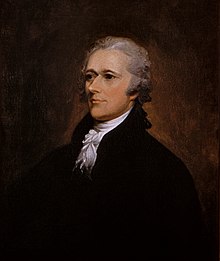 |
| Alexander Hamilton (January 11, 1755 or 1757 – July 12, 1804) |
In honor of Hamilton's outstanding showing at the Tony's last night!
Hamilton was a Founding Father of the United States, chief staff aide to General George Washington, one of the most influential interpreters and promoters of the U.S. Constitution, the founder of the nation's financial system, the founder of the Federalist Party, the world's first voter-based political party, the founder of the United States Coast Guard, and the founder of The New York Post newspaper. As the first Secretary of the Treasury, Hamilton was the primary author of the economic policies of the George Washington administration. Hamilton took the lead in the funding of the states' debts by the Federal government, the establishment of a national bank, a system of tariffs, and friendly trade relations with Britain. He led the Federalist Party, created largely in support of his views; he was opposed by the Democratic-Republican Party, led by Thomas Jefferson and James Madison, which despised Britain and feared that Hamilton's policies of a strong central government would weaken the American commitment to Republicanism.You can read more on Wikipedia.
Born out of wedlock, raised in the West Indies, and orphaned as a child, Hamilton pursued a college education through the help of local wealthy men. Recognized for his abilities and talent, he was sent to King's College (now Columbia University) in New York City. Hamilton played a major role in the American Revolutionary War. At the start of the war in 1775, he joined a militia company. In early 1776, he raised a provincial artillery company, to which he was appointed captain. He soon became the senior aide to General Washington, the American forces' commander-in-chief. Washington sent him on numerous important missions to tell generals what Washington wanted. After the war, Hamilton was elected to the Congress of the Confederation from New York. He resigned, to practice law, and founded the Bank of New York. Hamilton was among those dissatisfied with the weak national government. He led the Annapolis Convention, which successfully influenced Congress to issue a call for the Philadelphia Convention, in order to create a new constitution. He was an active participant at Philadelphia; and he helped achieve ratification by writing 51 of the 85 installments of The Federalist Papers, which to this day are the single most important reference for Constitutional interpretation.
Hamilton became the leading cabinet member in the new government under President Washington. Hamilton was a nationalist, who emphasized strong central government and successfully argued that the implied powers of the Constitution provided the legal authority to fund the national debt, assume states' debts, and create the government-backed Bank of the United States. These programs were funded primarily by a tariff on imports, and later also by a highly controversial tax on whiskey. Facing well-organized opposition from Jefferson and Madison, Hamilton mobilized a nationwide network of friends of the government, especially bankers and businessmen. It became the Federalist Party. A major issue splitting the parties was the Jay Treaty, largely designed by Hamilton in 1794. It established friendly economic relations with Britain to the chagrin of France and the supporters of the French Revolution. Hamilton played a central role in the Federalist party, which dominated national and state politics until it lost the election of 1800 to Jefferson's Democratic Republicans.
In 1795, he returned to the practice of law in New York. He tried to control the policies of President Adams (1797–1801). In 1798 and 99, Hamilton called for mobilization against France after the XYZ Affair and became commander of a new army, which he readied for war. However, the Quasi-War, while hard-fought at sea, was never officially declared and did not involve army action. In the end, Adams found a diplomatic solution which avoided a war with France. Hamilton's opposition to Adams' re-election helped cause his defeat in the 1800 election. When Jefferson and Aaron Burr tied for the presidency in the electoral college in 1801, Hamilton helped to defeat Burr, whom he found unprincipled, and to elect Jefferson despite philosophical differences. Hamilton continued his legal and business activities in New York City, but lost much of his national prominence within the Federalist party. When Vice President Burr ran for governor of New York state in 1804, Hamilton crusaded against him as unworthy. Taking offense at some of Hamilton's comments, Burr challenged him to a duel in 1804 and mortally wounded Hamilton, who died the next day.
Hamilton was with Washington during the big battles in NJ - Trenton, Princeton and Monmouth.
Further Reading - Minimual list, there is a lot out there!
Alexander Hamilton by Ron Chernow (book)
Alexander Hamilton - Biography.com
Alexander Hamilton - History.com
Alexander Hamilton - PBS
Hamilton and the U.S. Constitution - PBS
Alexander Hamilton - Army History

No comments:
Post a Comment
Hi Janeites! Thank you for visiting our website. We invite you to comment on our content. Of course, Lady Catherine would believe us all to behave like gentlemen and ladies, so please let us not disappoint her.
Also, please leave comments in English, as only Lady Catherine, had she ever studied a foreign language, would be a great profient enough to read such comments. (Merci! Arigato! Gracias!)